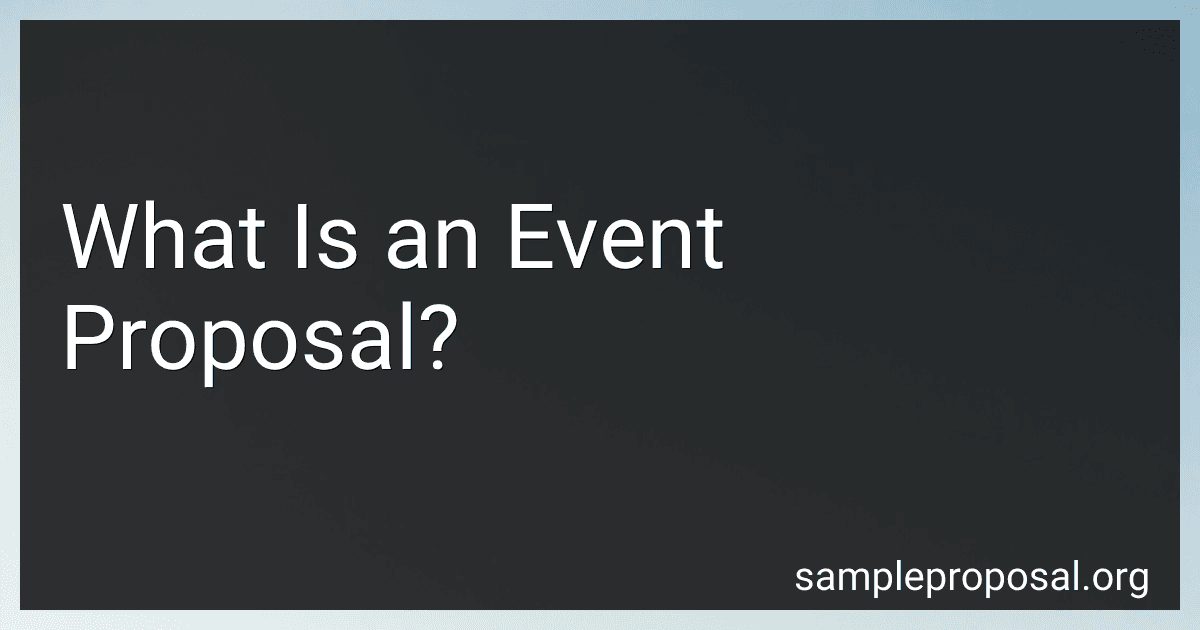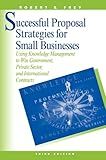Best Event Proposal Tools to Buy in February 2026
An event proposal is a written document that outlines the details and objectives of a proposed event such as a conference, seminar, fundraiser, or wedding. This document serves as a roadmap for planning and executing the event, providing a comprehensive overview of the event's purpose, target audience, budget, timeline, logistics, and marketing strategies. The event proposal is typically used to secure approval and funding from stakeholders such as clients, sponsors, or event planning committees. It also serves as a communication tool to ensure that all parties involved are on the same page and have a clear understanding of the event's goals and requirements. A well-crafted event proposal is essential for successfully organizing and executing a memorable and successful event.
What should be included in an event proposal?
- Introduction: Include a brief overview of the event, its purpose, and the expected outcome.
- Event details: Provide information on the date, time, and location of the event, as well as any special requirements or preferences.
- Objective: Clearly outline the goals and objectives of the event, and explain how these will be achieved.
- Target audience: Describe the target audience for the event, including demographics, interests, and any other relevant information.
- Budget: Include a detailed budget for the event, outlining all costs and expenses, as well as any potential revenue sources.
- Event program: Provide a detailed event program, including a schedule of activities, speakers, entertainment, and any other planned elements.
- Promotion and marketing plan: Outline how the event will be promoted and marketed, including strategies for reaching the target audience and generating interest.
- Sponsorship opportunities: Include information on potential sponsorship opportunities, including benefits for sponsors and packages available.
- Event logistics: Describe the logistical details of the event, including set-up, equipment, staffing, and any other operational considerations.
- Evaluation plan: Explain how the success of the event will be measured and evaluated, including any feedback mechanisms or post-event surveys.
How to incorporate feedback into an event proposal?
- Review the feedback: Start by carefully reviewing all the feedback received from potential attendees, stakeholders, and other parties involved in the event. Pay close attention to any common themes or suggestions that emerge.
- Identify areas for improvement: Based on the feedback received, identify specific areas of the event proposal that could be improved upon or modified. This may include elements such as the event format, speaker lineup, agenda, marketing strategy, or budget.
- Incorporate suggestions: Take the feedback received into consideration and incorporate specific suggestions into the event proposal. This may involve making changes to the event timeline, refining the event theme, adjusting the budget allocation, or enhancing the overall attendee experience.
- Communicate changes: Clearly communicate any changes or updates made to the event proposal as a result of feedback received. This can be done through an updated proposal document, email communication, or a presentation to stakeholders.
- Seek further input: If possible, seek further input or feedback on the revised event proposal from key stakeholders or potential attendees. This can help ensure that the changes made are well-received and align with the expectations of the target audience.
- Continuously evaluate and adjust: Throughout the event planning process, continue to gather feedback and evaluate the effectiveness of the proposed changes. Be open to making further adjustments as needed to ensure the success of the event.
What is the importance of setting clear objectives in an event proposal?
Setting clear objectives in an event proposal is important for several reasons:
- Clarity: Clear objectives help to ensure that everyone involved in the event, from organizers to vendors to attendees, understands what is expected and what the goals of the event are.
- Focus: Clearly defined objectives help to keep the planning and execution of the event on track and prevent unnecessary distractions or deviations from the original plan.
- Evaluation: Setting clear objectives allows for the event to be evaluated effectively after it has taken place. By comparing the outcomes of the event to the stated objectives, organizers can assess the success of the event and identify areas for improvement.
- Communication: Clear objectives help to effectively communicate the purpose and goals of the event to all stakeholders involved. This can help to align everyone's efforts towards a common goal and ensure a successful outcome.
- Accountability: Having clear objectives in the event proposal helps to hold organizers and stakeholders accountable for achieving the desired results. It provides a framework for measuring success and ensuring that everyone is working towards the same end goal.
In summary, setting clear objectives in an event proposal is essential for ensuring that the event is planned and executed effectively, that everyone is on the same page, and that the goals of the event are achieved.
What is the ideal length for an event proposal?
The ideal length for an event proposal can vary depending on the specific event and the organization requesting the proposal. However, a good rule of thumb is to keep the proposal concise and to the point, while still providing all necessary details and information. A typical event proposal may range from 5-15 pages, depending on the complexity and scale of the event. It is important to include a brief executive summary, event overview, budget, target audience, marketing plan, timeline, and any other relevant details. Ultimately, the key is to be thorough and informative, while also respecting the reader's time and attention.
How to address potential risks and challenges in an event proposal?
- Identify the potential risks and challenges: Start by conducting a thorough risk assessment to identify any potential risks and challenges that could arise during the event planning and execution process. This could include things like bad weather, technical issues, security concerns, or budget constraints.
- Develop a risk management plan: Once you have identified the potential risks, create a detailed risk management plan that outlines how each risk will be mitigated or addressed. This plan should include specific actions, responsibilities, and timelines for managing each risk effectively.
- Build contingency plans: In addition to your risk management plan, it's important to also develop contingency plans for any unexpected challenges that may arise during the event. This could include having backup vendors or suppliers, alternative event locations, or emergency communication protocols in place.
- Communicate with stakeholders: Keep all stakeholders informed about the potential risks and challenges, as well as the steps being taken to address them. This could include the event organizers, sponsors, vendors, and attendees. Transparency and clear communication can help build trust and confidence in the event planning process.
- Monitor and adapt: Throughout the event planning process, continue to monitor for new risks and challenges that may arise. Be prepared to adapt your plan as needed to address these new challenges effectively and ensure the successful execution of the event.
By following these steps and proactively addressing potential risks and challenges in your event proposal, you can help minimize the likelihood of problems arising and ensure a successful and seamless event experience for all involved.



